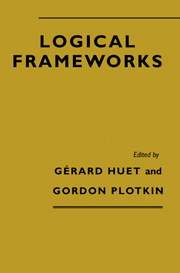Introduction
Published online by Cambridge University Press: 04 August 2010
Summary
This book contains a collection of papers concerned with logical frameworks. Such frameworks arise in a number of ways when considering the relationship between logic and computation, and indeed the general structure of logical formalisms. In particular, in Computer Science, there is interest in the representation and organization of mathematical knowledge on the computer, and in obtaining computational assistance with its derivation. One would especially like to implement program logics and prove programs correct. Again, there is direct computational content in various logical formalisms, particularly constructive ones. Finally, such issues provoke interest in re-examining purely logical questions.
Logical frameworks arise in two distinct but related senses. First, very many logics are of interest in Computer Science, and great repetition of effort is involved in implementing each. It would therefore be helpful to create a single framework, a kind of meta-logic, which is itself implementable and in which the logics of interest can be represented. Putting the two together there results an implementation of any represented logic.
In the second sense, one chooses a particular “universal” logic which is strong enough to do all that is required, and sticks to it. For example, one might choose a set theory, and do mathematics within that. Both approaches have much in common. Even within a fixed logic there is the need for a descriptive apparatus for particular mathematical theories, notations, derived rules and so on. Providing such is rather similar to providing a framework in the first sense.
- Type
- Chapter
- Information
- Logical Frameworks , pp. ix - xiiPublisher: Cambridge University PressPrint publication year: 1991
- 1
- Cited by



